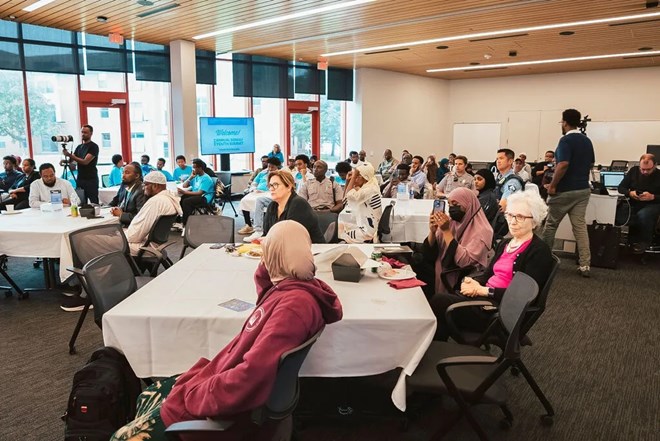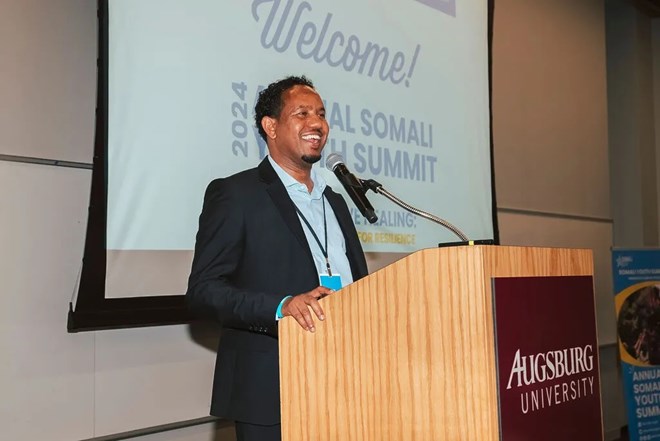
Friday May 31, 2024
A wide range of community members, from law enforcement to education to health to art, attended the second annual Somali Youth Summit held at Augsburg University.
As a youth worker in Minneapolis for over 20 years, Mukhtar has seen most, if not all, of the issues impacting young people in the Somali community.
In the mid-2000s, he worked at Brian Coyle Community Center in the Cedar-Riverside neighborhood, where he coached youth sports and programmed activities for the area’s children. Growing up, most children saw Mukhtar as an older brother and soon a father figure as he grew alongside them into adulthood.
advertisements
Now in his mid-40s, Mukhtar has witnessed the young people he once mentored losing their lives to addiction, gun violence, and mental health issues as life in America has grown increasingly complicated to navigate for members of the Somali community who had once escaped their country and arrived to the United States seeking refuge from the civil war.Mukhtar founded Daryeel Youth, derived from the word “care” in Somali, a nonprofit organization dedicated to supporting young East Africans on the ground without judgment. Daryeel allowed Mukhtar to connect with young people on their issues directly while facilitating conversations with the older generation of Somali parents to help bridge the gap between them and their children.
After witnessing a wave of synthetic drugs grip the community several years ago, Mukhtar was moved to engage in street outreach to connect young people to resources where they could find treatment.
Issues surrounding gun violence and street gangs were another focal point for Mukhtar, who continuously came across young people he once mentored and coached falling victim to the environment around them.
Many of the people Mukhtar interacted with had been a part of the afterschool programs that he managed at Brian Coyle, but because they aged out of the program or dropped out of school, they became at risk of falling through the cracks and eventually landing in situations where they were struggling with addiction or homelessness.
Over the years, he became dedicated to becoming a consistent person in their lives.
Mukhtar can be found every Friday at 8 p.m., handing out pizzas and tea at the plaza next to the Cedar Cultural Center. He has almost become a fixture in the neighborhood as he shows up like clockwork. He and some of his volunteers use the opportunity to speak to young people who have found themselves in a rough spot and may just need a warm meal paired with a warm smile to begin their path to healing.
This weekend marked the second annual Somali Youth Summit, a day-long event that brings together subject matter experts in the health and wellness fields to address various topics relating to supporting the community’s youth. The summit is a culmination of Mukhtar’s work and showcases the deep connections he’s formed over the years with organizational leaders and community members to address matters regarding youth.
The summit, held at the Hagfors Center at Augsburg University, featured speakers from various fields, including medical researchers, university faculty, artists, educators, and policymakers.

Abdirahman Mukhtar/ Photo by Jundi Media
Often, these community conversations took the form of workshops, where parents learned about child development and behavior issues in young people.
Mukhtar saw a widening gap between parents and their children that spanned not only a generation but also cultures.
“These kids are American kids,” Mukhtar said. “And even if they were not born here, there’s a lot of peer pressure in middle school [and] high school. Parents are used to sending their kids to school and thinking the school will take care of everything.”
Through his advocacy work, Mukhtar aims to encourage and empower parents in the Somali diaspora to be more active in their children’s lives outside of education.
The summit provided participants and attendees with a wide array of resources, as organizations such as law enforcement, treatment and recovery groups, Hennepin County, and environmental nonprofits tabled just outside the conference space.
Generations of Somalis attended the event to absorb the programming highlighting the current issues impacting the community’s young people.
Mukhtar expressed that his goal is to encourage Somali youth to be themselves and be compassionate with them, especially those who are struggling with addiction.
“We see our kids who are living in tents, who are unsheltered, who are living on the streets, some of them are even having babies,” he stated.
According to Mukhtar, the best course of action in doing youth work is to directly involve parents and mentors.
“You cannot do youth work without the family; that’s very important. You have to have resources, culturally appropriate services, and safe spaces where these conversations can take place.”
Mukhtar plans to scale the summit in the near future and invite more community members to band together to find solutions to contribute to the well-being of the community’s youth. In the meantime, he’ll continue to hand out pizza and tea, tackling these issues one conversation at a time.